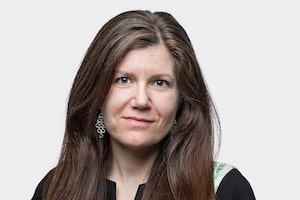
Technicians prepare the stage where United Conservative Party leader Jason Kenney would address supporters in Calgary on April 16, 2019.Jeff McIntosh/The Canadian Press
Jason Kenney, when he campaigned across Alberta to unite the province’s two main conservative parties, promised to pitch a big tent. He vowed to welcome Red Tories and social conservatives alike.
Now, with a leadership race on the horizon, Mr. Kenney’s United Conservative Party is losing its most high-profile moderate member: Doug Schweitzer. The Calgary cabinet minister earlier this week announced that he would neither seek the leadership of the party nor run for a second legislative term.
Mr. Schweitzer, who collected just 7-per-cent support in the UCP’s inaugural leadership contest, was widely expected to challenge for the party’s top job in the event that Mr. Kenney lost power. But even Mr. Schweitzer’s surprise decision to stay on the sidelines in the forthcoming leadership race is a defining moment for the UCP.
His departure weakens the UCP’s assertion that conservatives of all kinds can find allies within the organization.
“The big tent is obviously not sustainable,” said Thomas Lukaszuk, who was a cabinet minister under the Progressive Conservative banner before Mr. Kenney helped create the UCP in 2017 by merging the PCs with the Wildrose Party.
“If Jason Kenney couldn’t keep it together – the guy who sort of orchestrated all this – who is going to keep it together?” he asked
The UCP has not formally launched a race to replace Mr. Kenney, but the party is in the process of selecting a leadership election committee. That group will determine the race’s rules, such as its timing, entry fee and voting mechanism. Alberta’s next general election is scheduled for May, 2023; the UCP is expected to select a new leader this fall.
The UCP last week said Mr. Kenney garnered support from 51.4 per cent of UCP members who voted in its leadership review. Mr. Kenney on May 18 said he intended to resign; after a tense caucus meeting the following day, the party said he would remain UCP leader and Premier until members select a replacement.
Mr. Kenney last weekend confirmed that he would not enter the leadership race. Mr. Schweitzer, in a statement on social media Monday, said he would not be among the race’s contestants. He did not return a message seeking comment.
Mr. Lukaszuk is among those who never felt comfortable with Mr. Kenney’s brand of conservatism or his plan to retake power from the New Democratic Party by gluing together the PCs and the Wildrose. While the merger was swift and the UCP’s first election victory decisive, deep ideological canyons between the two sides remain. But conservatives who back the UCP argue that the party’s big-tent strategy will survive.
Erika Barootes, the founding president of the UCP, said that while Mr. Schweitzer was the “natural” representative for party moderates, his departure does not mean the tent will collapse.
“I don’t think one individual is critical to what the party direction is,” she said, predicting that other people aligned with his politics will enter the leadership race.
Rajan Sawhney, the Minister of Transportation, last week confirmed that she is considering putting her name forward. Rebecca Schulz, the Minister of Children’s Services, in an interview Friday also said that she is considering a run for leader. Both women are from Calgary and stayed out of the public spotlight when UCP MLAs fought over how to best manage the coronavirus pandemic.
So far, only two people have confirmed that they intend to enter the race, and both are former Wildrose leaders: Brian Jean and Danielle Smith.
Taleesha Thorogood, a consultant at Crestview Strategy who previously worked for Mr. Kenney, expects that some conservatives disillusioned with the UCP’s leadership options will stick with the party out of their shared distaste for the NDP.
“I think the conservatives across the spectrum have a greater fear of another NDP government than they do of voting for someone who may fall somewhere different from where they do across the party’s ideological continuum,” Ms. Thorogood said.
Strategists expect someone from Mr. Kenney’s circle to enter the race, and this week Travis Toews, the MLA for Grande Prairie-Wapiti, emerged as a top contender. He has served as Finance Minister since Mr. Kenney first swore in cabinet, meaning that he would be able to boast about overseeing Alberta’s swing into a surplus.
He is also a member of Mr. Kenney’s inner circle – he was among the cabinet ministers surreptitiously photographed while sitting on the patio of the Premier’s office, breaking COVID-19 gathering restrictions last year – and this association could bite him.
But despite his powerful cabinet position and close ties to the Premier, Mr. Toews has a low profile across the province. He avoided getting swept up in the UCP’s public drama, Ms. Thorogood noted.
In a campaign, he could tout his economic management skills while distancing himself from a leader that large swaths of the party and province view as toxic. At the same time, he could pitch himself as an experienced operator in a position to negotiate peace between Mr. Kenney’s camp and the Premier’s internal opponents.
Mr. Toews has not yet decided whether he will join the race. However, if he jumps in, Ms. Thorogood thinks other Kenney loyalists will shelve their leadership ambitions.
“It is a combination of [Mr. Toews] both being a leading contender and being currently kind of viewed as Kenney’s guy.”
We have a weekly Western Canada newsletter written by our B.C. and Alberta bureau chiefs, providing a comprehensive package of the news you need to know about the region and its place in the issues facing Canada. Sign up today.
 Carrie Tait
Carrie Tait